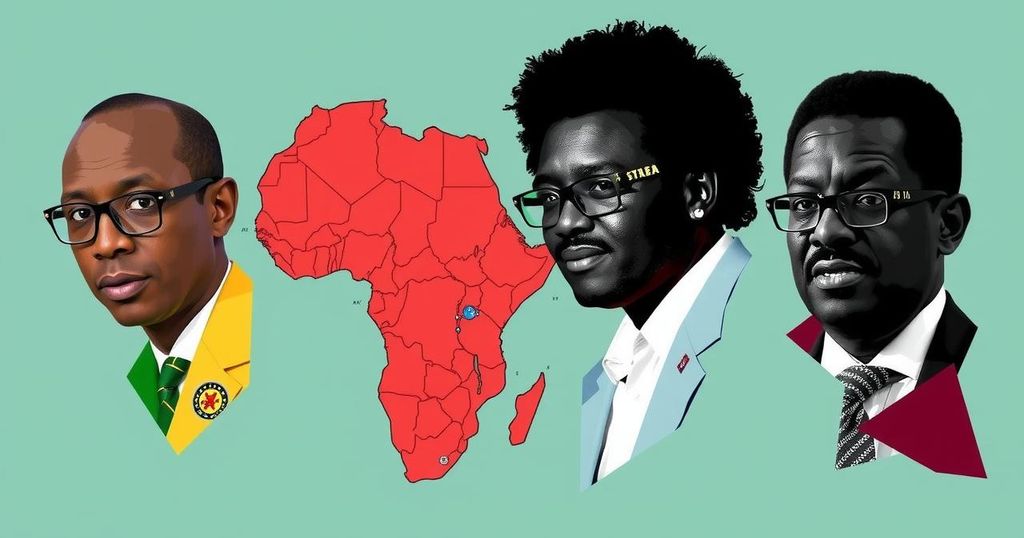Politics
” NUVUNGA, AFRICA, AMERICAN UNIVERSITY, AZALI ASSOUMANI, BOTSWANA, CENTER FOR DEMOCRACY AND HUMAN RIGHTS, COMOROS, CORRUPTION, DANIEL CHAPO, DEMOCRACY, DU, FRELIMO, GOVERNANCE, KWAKU NUAMAH, MAPUTO, MOZAMBIQUE, NAMIBIA, NUAMAH, OPPOSITION, SOUTH AFRICA, SOUTHERN AFRICA, SWAPO
Isaac Bennett
0 Comments
2024 African Elections: A Year of Political Continuity and Change
The 2024 African elections yielded a variety of results across the continent. While some ruling parties retained power amid controversy, countries like Botswana and Ghana saw significant shifts with opposition victories. Ruling parties in some regions faced violent protests and challenges to their legitimacy, while military juntas delayed elections in the Sahel region, indicating a struggle for democracy. The recent outcomes reflect both resilience and challenges within African political systems.
In 2024, several African nations conducted elections, resulting in a mixed bag of outcomes for ruling parties. While some incumbents, such as President Azali Assoumani of Comoros and Mozambique’s Frelimo party, successfully retained power amid opposition allegations of electoral fraud and subsequent unrest, other countries like Botswana witnessed a historic shift with the election of opposition leader Duma Gideon Boko, ending nearly 60 years of single-party rule. Moreover, South Africa’s African National Congress, having been in power since the end of apartheid, faced challenges as it failed to secure an outright majority, necessitating the formation of a coalition government. Meanwhile, in Rwanda, President Paul Kagame achieved an overwhelming victory, raising questions about the state’s democratic processes due to the alleged suppression of political opposition.
In West Africa, former President John Mahama made a notable comeback in Ghana, leveraging economic dissatisfaction among voters to defeat the ruling party candidate. Senegal marked another significant change with the election of 44-year-old Bassirou Diomaye Faye as its youngest president amid a backdrop of political crisis. In stark contrast, in the Sahel region, nations such as Mali and Burkina Faso postponed elections, showcasing the military juntas’ intentions to maintain authority in a climate of coups and unrest, as reflected in rising media restrictions and diminished freedoms elsewhere in the region.
The political landscape in Africa has been dynamic, particularly in the wake of the 2024 elections which highlighted the diverse responses of citizens across the continent. Longstanding rulers faced challenges from opposition parties and civil unrest in some regions, underscoring the deep-seated political and economic issues influencing voter behavior. The elections not only reflected the citizens’ desire for change but also revealed the ongoing struggles with governmental transparency, accountability, and the effectiveness of democratic practices. These elections are critical in understanding shifts in power dynamics and the future of governance in Africa, particularly for nations grappling with economic hardship and political unrest.
In summary, the 2024 African elections represented a pivotal moment for several countries, showcasing a mixture of continuity and change in governance. While ruling parties in certain nations managed to secure their positions amid allegations of malpractice, others experienced significant electoral upsets reflecting public discontent. The contrasts observed across the continent—from the success in historical transitions to the ongoing challenges in military-ruled nations—illustrate the complex political landscape and varying paths toward democracy in Africa. The implications of these elections will likely shape the region’s political narratives well into the future.
Original Source: www.voanews.com




Post Comment